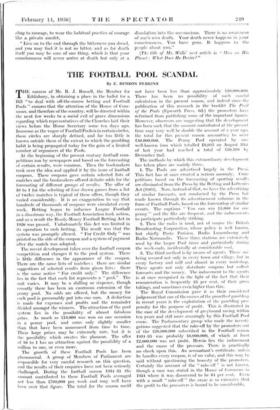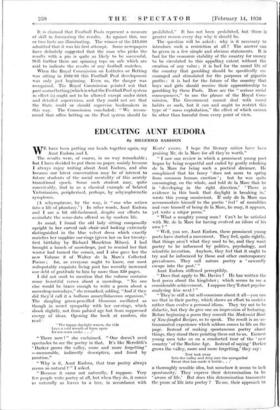THE FOOTBALL POOL SCANDAL By . E. BENSON PERKINS At the
beginning of the present century football com- petitkins run by newspapers and based on the forecasting of certain results, were common. Then the bookmakers took over the idea and applied it by the issue of football coupons. These coupons gave certain selected lists of matches and the bookmakers offered definite odds for the forecasting of different groups of results. The offer of 10 to 1 for the selecting of four drawn games from a list of twelve matches is typical of these offers, though they varied. conSiderably. It is no exaggeration to say that hundreds of thousands of coupons were circulated every week. Betting began to influence League Football in a disastrous way, the Football Association took action, and as. a *Suit the Ready-Money Football Betting Act in 1920 was passed. Unfortunately this Act was limited in its operation to cash betting. The result was that the systein was promptly altered. " For Credit Only " was printed on the side of the coupon and a system of payment after the match was adopted.
The recent development takes over the football coupon competition and changes it to the pool system. There is little- difference in the appearance of the coupon. There. are the same lists. of matches : there are similar suggestions of selected results from given lists : there is the same notice " For credit only." The difference lies in the fact that each list -represents a " pool." The unit varies. It may be a shilling or sixpence, though recently there has been an enormous extension of the penny pool. No odds are offered, but the money for each pool is presumably put into one sum. A deduction is made for expenses and profits and the remainder divided amongst the winners. The attraction of the pool system lies in the possibility of almost fabulous gains. As much as £13,000 was won on one occasion in a penny pool, and sums only slightly smaller than that have been announced from time to time. These large prizes may be extremely rare, but it is the possibility which creates the glamour. The offer of 10 to 1 has no attraction against the possibility of a million to one, or even more.
The growth of these Football Pools has been phenomenal. A group of Members of Parliament arc responsible for very careful research on this question, and the results of their enquiries have not been seriously challenged. During the football . season 1934-35 the amount contributed to these Football Pools . averaged not less than £700,000 per week and may well have been over that figure. The total for the season could not have been less than approximately £20,000,000. There has been no possibility of such careful calculation in the present season, and indeed since the publication of this research in flit' booklet The Peril of the Pools (Epworth Press, 6d.) the promoters have 'refrained from publishing some of the important figures.
However, observers arc suggesting that the development has been such that the amount contributed at the present time may very well be double the amount of a year ago, the total for this present season amounting to over £40,000,000. The Penny Pool operated by cue well-known firm 'which totalled £8,045 on August 31st Of last year had reached a total of £20,568 bv December 2nd.
The methods by which this extraordinary development has taken place are mainly three.
1. The Pools are advertised largely in the PresS. This fact has at once created a serious anomaly. Coin- petitions based on the forecasting of sporting results are eliminated from the Press by the Betting and Lotteries Act (1934). Now, instead of that, we have the advertising of similar forecasts; not conducted by the Press but made known through its advertisement columns in the form of Football Pools, based on the forecasting of similar events. The captions " You can win £5,000 for one penny " and the like are frequent, and the inducements to participate particularly striking.
2. Then the radio is used, not of course the British Broadcasting Corporation, whose policy is well known, but chiefly Poste Parisien, Radio Luxembourg and Radio Normandie. These three stations arc extensively used by the larger Pool firms and particularly during the week-ends, incidentally at considerable cost.
3. The third method is by means of agents. These are being secured not only in every town and village, but in every factory and mill and almost in every workshop.
These agents not only distribute coupons but collect forecasts and the money. The inducement to the agents is at once recognised in the light of the fact that their remuneration is frequently 25 per cent. of their gross takings, and sometimes even higher than this.
The Royal Commission gave it as their considered judgement that one of the causes of the growth of gambling in recent years is the exploitation of the gambling pro- pensity for the purpose of profit. This is illustrated in the case of the development of greyhound racing within ten years and still more amazingly by this Football Pool craze. The Parliamentary group who made the investil gations suggested that the rake-off by the promoters out of the £20,000,000 subscribed in the Football season .1934-35 was probably 5-6,000,000, of which at least £2,000,000. was net profit. Herein lies the inducement and the cause of the pressure. There is practically no check upon; this. An accountant's certificate, unless he handles every coupon, is of no value, and this may lo; said without questioning the honesty of the promoters. Certainly the amount of the " rake-off " is not known, though a case was stated in the House of Commons in 1934 where it was discovered to be 64 per cent. Even with a small " rake-off ". the craze is so extensive that the profit to the promoters is bound to be considerable. It is claimed that Football Pools represent a measure of skill in forecasting the results. As against, this, one or two facts are illuminating. The winner of the £13,000 admitted that it was his first attempt. Some newspapers have definitely suggested that the man who picks the results with a pin is quite as likely to be successful. Still further there are spinning tops on sale which are said to indicate the results of any football matches.
When the Royal Commission on Lotteries or Betting was sitting in 1932-33 this Football Pool development was only just beginning. Even so, the danger was recognised. The Royal Commission pointed out that pari-mutuel betting (which is what the Football Pool system in effect is) ought not to be allowed except under strict and detailed supervision, and they could not see that the State Could or should supervise bookmakers in this way. The Commission concluded : " We recom- mend that- office- betting on the Pool system should be prohibited." • It has not been prohibited; but there is greater reason every day why it should be.
- The question will be asked : why is it necessary to introduce such a restriction at all ? The answer 'can . be- given in a few simple and obvious statements. It is bad for the economic stability of the country for money to be circulated to this appalling extent without the creation of any value ; it is bad for the moral life of -the country that gambling should be specifically en- couraged and stimulated for the purposes. of gigantic profits : it is bad for the future of the country that boys and girls should receive their apprenticeship to gambling by these Pools.. Here are the." serious social consequences," to use the phrase of the Royal Com- mission. The Government cannot deal with moral habits as such, but it can and ought to restrict this type of " mass exploitation," the effect of which cannot be other than harmful from every point of view.















































 Previous page
Previous page